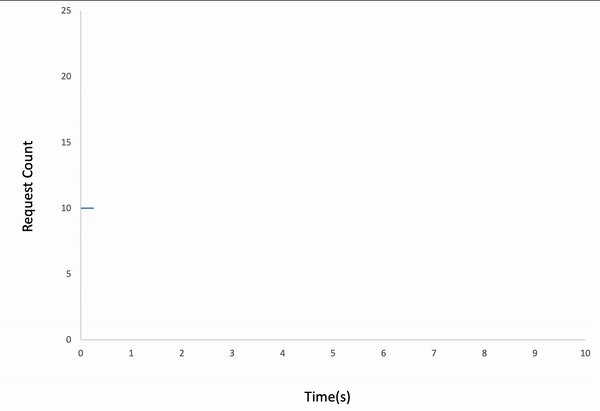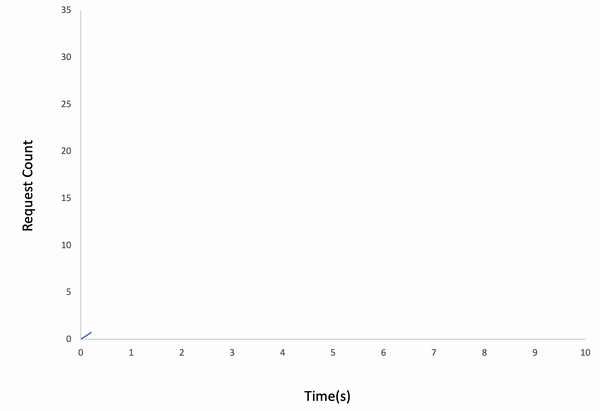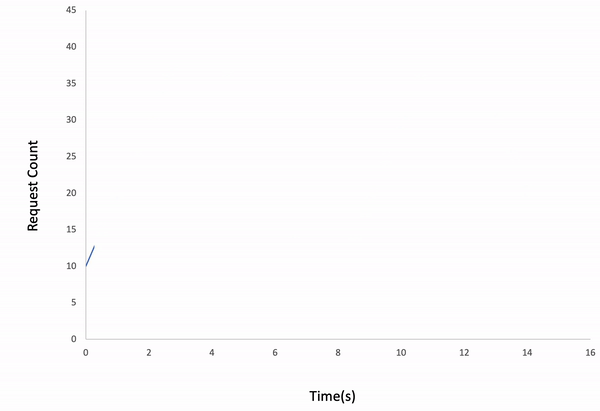Ddosify - High-performance load testing tool
Features
![]() Protocol Agnostic - Currently supporting HTTP, HTTPS, HTTP/2. Other protocols are on the way.
Protocol Agnostic - Currently supporting HTTP, HTTPS, HTTP/2. Other protocols are on the way.
![]() Scenario-Based - Create your flow in a JSON file. Without a line of code!
Scenario-Based - Create your flow in a JSON file. Without a line of code!
![]() Different Load Types - Test your system’s limits across different load types.
Different Load Types - Test your system’s limits across different load types.
Installation
ddosify is available via Docker, Homebrew Tap, and downloadable pre-compiled binaries from the releases page for macOS, Linux and Windows.
Docker
docker run -it --rm ddosify/ddosify
Homebrew Tap (macOS and Linux)
brew install ddosify/tap/ddosify
apk, deb, rpm, Arch Linux packages
- For arm architectures change
ddosify_amd64toddosify_arm64orddosify_armv6. - Superuser privilege is required.
For Redhat based (Fedora, CentOS, RHEL, etc.) rpm -i https://github.com/ddosify/ddosify/releases/latest/download/ddosify_amd64.rpm # For Debian based (Ubuntu, Linux Mint, etc.) wget https://github.com/ddosify/ddosify/releases/latest/download/ddosify_amd64.deb dpkg -i ddosify_amd64.deb # For Alpine wget https://github.com/ddosify/ddosify/releases/latest/download/ddosify_amd64.apk apk add --allow-untrusted ddosify_amd64.apk # For Arch Linux git clone https://aur.archlinux.org/ddosify.git cd ddosify makepkg -sri
Using the convenience script (macOS and Linux)
- The script requires root or sudo privileges to move ddosify binary to
/usr/local/bin. - The script attempts to detect your operating system (macOS or Linux) and architecture (arm64, x86, amd64) to download the appropriate binary from the releases page.
- By default, the script installs the latest version of
ddosify. - If you have problems, check common issues
- Required packages:
curlandsudo
curl -sSfL https://raw.githubusercontent.com/ddosify/ddosify/master/scripts/install.sh | sh
Go install from source (macOS, Linux, Windows)
go install -v go.ddosify.com/ddosify@latest
Easy Start
This section aims to show you how to use Ddosify without deep dive into its details easily.
ddosify -t target_site.com
The above command runs a load test with the default value that is 100 requests in 10 seconds.
2. ### Using some of the features
ddosify -t target_site.com -n 1000 -d 20 -p HTTPS -m PUT -T 7 -P http://proxy_server.com:80
Ddosify sends a total of 1000 PUT requests to https://target_site.com over proxy http://proxy_server.com:80 in 20 seconds with a timeout of 7 seconds per request.
3. ### Usage for CI/CD pipelines (JSON output)
ddosify -t target_site.com -o stdout-json | jq .avg_duration
Ddosify outputs the result in JSON format. Then jq (or any other command-line JSON processor) fetches the avg_duration. The rest depends on your CI/CD flow logic.
4. ### Scenario based load test
ddosify -config config_examples/config.json
Ddosify first sends HTTP/2 POST request to https://test_site1.com/endpoint_1 using basic auth credentials test_user:12345 over proxy http://proxy_host.com:proxy_port and with a timeout of 3 seconds. Once the response is received, HTTPS GET request will be sent to https://test_site1.com/endpoint_2 along with the payload included in config_examples/payload.txt file with a timeout of 2 seconds. This flow will be repeated 20 times in 5 seconds and response will be written to stdout.
Details
You can configure your load test by the CLI options or a config file. Config file supports more features than the CLI. For example, you can’t create a scenario-based load test with CLI options.
CLI Flags
ddosify [FLAG]
| Flag | Description | Type | Default | Required? |
|---|---|---|---|---|
-t |
Target website URL. Example: https://ddosify.com | string |
- | Yes |
-n |
Total request count | int |
100 |
No |
-d |
Test duration in seconds. | int |
10 |
No |
-p |
Protocol of the request. Supported protocols are HTTP, HTTPS. HTTP/2 support is only available by using a config file as described. More protocols will be added. | string |
HTTPS |
No |
-m |
Request method. Available methods for HTTP(s) are GET, POST, PUT, DELETE, UPDATE, PATCH | string |
GET |
No |
-b |
The payload of the network packet. AKA body for the HTTP. | string |
- | No |
-a |
Basic authentication. Usage: -a username:password |
string |
- | No |
-h |
Headers of the request. You can provide multiple headers with multiple -h flag. |
string |
- | No |
-T |
Timeout of the request in seconds. | int |
5 |
No |
-P |
Proxy address as host:port. -P http://user:pass@proxy_host.com:port' |
string |
- | No |
-o |
Test result output destination. Supported outputs are [stdout, stdout-json] Other output types will be added. | string |
stdout |
No |
-l |
Type of the load test. Ddosify supports 3 load types. | string |
linear |
No |
-config |
Config File of the load test. | string |
- | No |
-version |
Prints version, git commit, built date (utc), go information and quit | - | - | No |
Load Types
Linear
ddosify -t target_site.com -l linear
Result:
Note: If the request count is too low for the given duration, the test might be finished earlier than you expect.
Incremental
ddosify -t target_site.com -l incremental
Result:
Waved
ddosify -t target_site.com -l waved
Result:
Config File
Config file lets you use all capabilities of Ddosify.
The features you can use by config file;
- Scenario creation
- Custom load type creation
- Payload from a file
- Multipart/form-data payload
- Extra connection configuration, like keep-alive enable/disable logic
- HTTP2 support
Usage;
ddosify -config <json_config_path>
There is an example config file at config_examples/config.json. This file contains all of the parameters you can use. Details of each parameter;
request_countoptionalThis is the equivalent of the-nflag. The difference is that if you have multiple steps in your scenario, this value represents the iteration count of the steps.load_typeoptionalThis is the equivalent of the-lflag.durationoptionalThis is the equivalent of the-dflag.manual_loadoptionalIf you are looking for creating your own custom load type, you can use this feature. The example below says that Ddosify will run the scenario 5 times, 10 times, and 20 times, respectively along with the provided durations.request_countanddurationwill be auto-filled by Ddosify according tomanual_loadconfiguration. In this example,request_countwill be 35 and thedurationwill be 18 seconds. Alsomanual_loadoverridesload_typeif you provide both of them. As a result, you don’t need to provide these 3 parameters when usingmanual_load.
“manual_load”: [ {“duration”: 5, “count”: 5}, {“duration”: 6, “count”: 10}, {“duration”: 7, “count”: 20} ]
proxyoptionalThis is the equivalent of the-Pflag.outputoptionalThis is the equivalent of the-oflag.stepsmandatoryThis parameter lets you create your scenario. Ddosify runs the provided steps, respectively. For the given example file step id: 2 will be executed immediately after the response of step id: 1 is received. The order of the execution is the same as the order of the steps in the config file.Details of each parameter for a step;idmandatoryEach step must have a unique integer id.urlmandatoryThis is the equivalent of the-tflag.nameoptional Name of the step.protocoloptionalThis is the equivalent of the-pflag.methodoptionalThis is the equivalent of the-mflag.headersoptionalList of headers with key:value format.payloadoptionalThis is the equivalent of the-bflag.payload_fileoptionalIf you need a long payload, we suggest using this parameter instead ofpayload.payload_multipartoptional Use this formultipart/form-dataContent-Type.Accepts list ofform-fieldobjects, structured as below;
{ “name”: [field-name], “value”: [field-value|file-path|url], “type”: <text|file>, // Default “text” “src”: <local|remote> // Default “local” }
Example: Sending form name-value pairs;
“payload_multipart”: [ { “name”: “[field-name]”, “value”: “[field-value]” } ]
Example: Sending form name-value pairs and a local file;
“payload_multipart”: [ { “name”: “[field-name]”, “value”: “[field-value]”, }, { “name”: “[field-name]”, “value”: “./test.png”, “type”: “file” } ]
Example: Sending form name-value pairs and a local file and a remote file;
“payload_multipart”: [ { “name”: “[field-name]”, “value”: “[field-value]”, }, { “name”: “[field-name]”, “value”: “./test.png”, “type”: “file” }, { “name”: “[field-name]”, “value”: “http://test.com/test.png”, “type”: “file”, “src”: “remote” } ]
Note: Ddosify adds Content-Type: multipart/form-data; boundary=[generated-boundary-value] header to the request when using payload_multipart.
timeoutoptionalThis is the equivalent of the-Tflag.sleepoptional Sleep duration(ms) before executing the next step. Can be an exact duration or a range.Example: Sleep 1000ms after step-1;
“steps”: [ { “id”: 1, “url”: “target.com/endpoint1”, “sleep”: “1000” }, { “id”: 2, “url”: “target.com/endpoint2”, } ]
Example: Sleep between 300ms-500ms after step-1;
“steps”: [ { “id”: 1, “url”: “target.com/endpoint1”, “sleep”: “300-500” }, { “id”: 2, “url”: “target.com/endpoint2”, } ]
authoptionalBasic authentication.
“auth”: { “username”: “test_user”, “password”: “12345” }
othersoptionalThis parameter accepts dynamic key: value pairs to configure connection details of the protocol in use.
“others”: { “keep-alive”: true, // Default false “disable-compression”: false, // Default true “h2”: true, // Enables HTTP/2. Default false. “disable-redirect”: true // Default false }
Common Issues
macOS Security Issue
"ddosify" can’t be opened because Apple cannot check it for malicious software.
- Open
/usr/local/bin - Right click
ddosifyand select Open - Select Open
- Close the opened terminal
Communication
You can join our Discord Server for issues, feature requests, feedbacks or anything else.
More
This repository includes the single-node version of the Ddosify Loader. Ddosify Cloud will be available soon. It will support multi-location based distributed load testing and more features.
Join the waitlist: https://ddosify.com
License
Licensed under the AGPLv3: https://www.gnu.org/licenses/agpl-3.0.html



